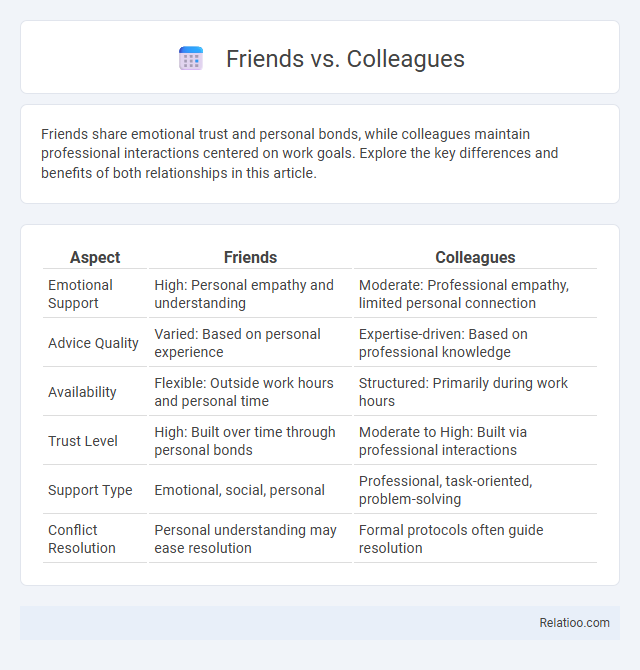Friends share emotional trust and personal bonds, while colleagues maintain professional interactions centered on work goals. Explore the key differences and benefits of both relationships in this article.
Table of Comparison
| Aspect | Friends | Colleagues |
|---|---|---|
| Emotional Support | High: Personal empathy and understanding | Moderate: Professional empathy, limited personal connection |
| Advice Quality | Varied: Based on personal experience | Expertise-driven: Based on professional knowledge |
| Availability | Flexible: Outside work hours and personal time | Structured: Primarily during work hours |
| Trust Level | High: Built over time through personal bonds | Moderate to High: Built via professional interactions |
| Support Type | Emotional, social, personal | Professional, task-oriented, problem-solving |
| Conflict Resolution | Personal understanding may ease resolution | Formal protocols often guide resolution |
Understanding Friendship and Colleague Relationships
Friendship involves emotional support, trust, and personal connection, fostering deep bonds beyond professional settings. Colleague relationships center on teamwork, shared goals, and workplace collaboration, often lacking the intimacy found in friendships. Understanding these dynamics helps navigate social interactions by distinguishing emotional closeness from professional association.
Emotional Connections: Friends vs Colleagues
Friends offer deep emotional connections rooted in trust, shared experiences, and mutual support, creating bonds that extend beyond daily interactions. Colleagues typically engage in professional relationships centered on collaboration and task completion, with limited emotional involvement. Your emotional well-being benefits more from friendships that provide genuine empathy and understanding compared to the functional dynamic of colleague relationships.
Trust and Loyalty in Both Dynamics
Trust and loyalty form the backbone of both friendships and colleague relationships, yet they manifest differently in each dynamic. Friends often share deeper emotional bonds and unconditional support, which foster a stronger sense of loyalty beyond situational needs, while colleagues typically exhibit trust based on professional reliability and mutual goals. You can build lasting professional respect by balancing personal trust with workplace loyalty, ensuring healthy connections in both spheres.
Communication Styles in Friendships and Workplaces
Communication styles in friendships are typically informal, open, and emotionally expressive, fostering trust and mutual support. In contrast, workplace communication among colleagues tends to be more structured, task-oriented, and professional, prioritizing clarity and efficiency. Understanding these differences enhances Your ability to navigate social interactions effectively across both personal and professional settings.
Boundaries: Where to Draw the Line
Drawing boundaries between friends, colleagues, and the overlap of friend-colleagues is essential for maintaining respect and professionalism. Friends offer emotional support and personal connection with flexible boundaries, while colleagues require clear limits centered on work responsibilities and professionalism. Friend-colleagues straddle both worlds, making it crucial to balance personal trust with workplace decorum to prevent conflicts and maintain productivity.
Conflict Resolution: Personal vs Professional Approaches
Conflict resolution between friends often involves emotional understanding and personal empathy, prioritizing relationship preservation through open communication and compromise. In contrast, colleagues typically rely on structured professional approaches such as mediation, formal feedback, and adherence to organizational policies to resolve disputes. Friend-colleague dynamics blend these methods, requiring a balance of personal rapport and professional boundaries to effectively navigate conflicts.
Support Systems: Friends and Colleagues Compared
Friends provide emotional support through deep personal understanding and shared experiences, strengthening your resilience during challenging times. Colleagues offer professional support by sharing expertise and collaborating on work-related tasks, enhancing productivity and career growth. Your network benefits from balancing these support systems, combining personal empathy with practical assistance for comprehensive well-being.
Socialization Outside Work: Pros and Cons
Socializing outside work with friends fosters deep emotional bonds and genuine support, enhancing personal well-being, while colleagues offer practical networking benefits but may lack emotional intimacy. Mixing friends and colleagues can blur professional boundaries, potentially leading to conflicts or favoritism in the workplace. Balancing social interactions by maintaining clear distinctions between friends and colleagues helps optimize both personal relationships and career growth.
Navigating Transitions: When Colleagues Become Friends
Navigating transitions when colleagues become friends requires balancing professionalism with personal connection to maintain workplace harmony and productivity. Clear boundaries and mutual respect are essential to prevent conflicts and ensure both work responsibilities and friendship thrive. Open communication helps address challenges and fosters trust as the relationship evolves from colleagues to genuine friends.
Impact on Career and Personal Well-being
Friends provide emotional support and foster a positive mindset, boosting personal well-being and indirectly enhancing career resilience. Colleagues contribute to professional growth through collaboration, networking, and skill-sharing, directly impacting career advancement but may offer limited personal support. Balancing relationships with both friends and colleagues creates a synergistic effect, promoting mental health and sustained career success.

Infographic: Friends vs Colleagues
 relatioo.com
relatioo.com